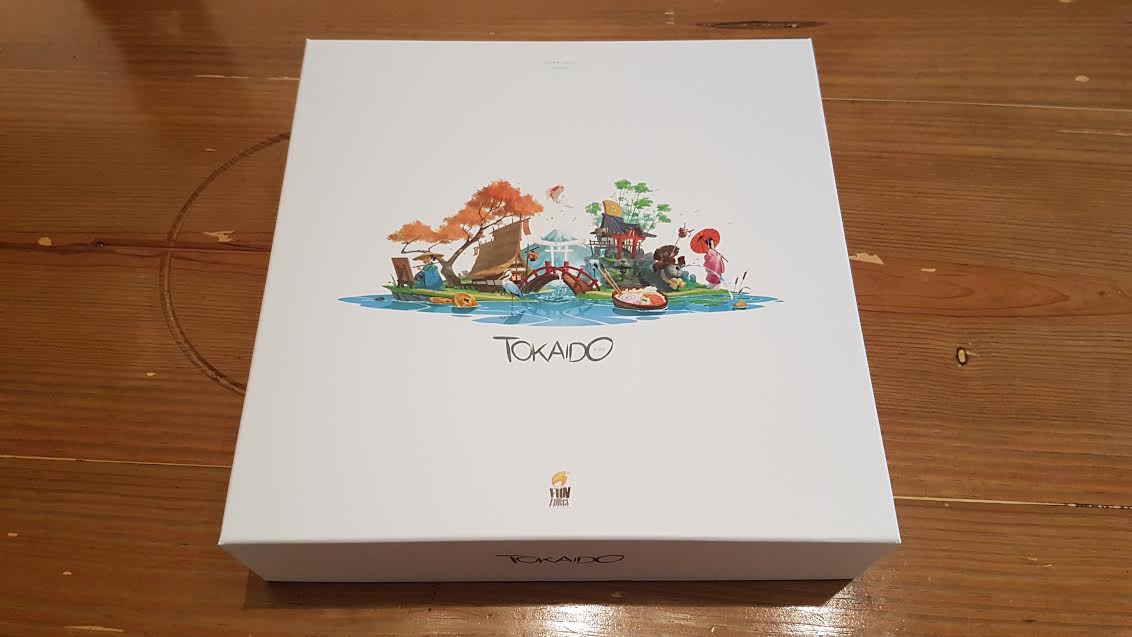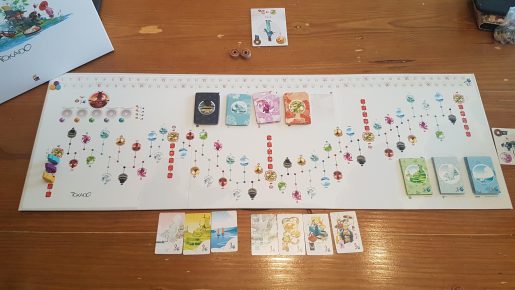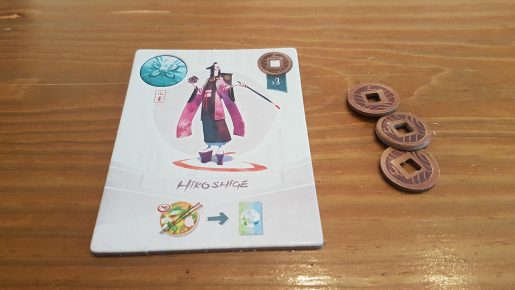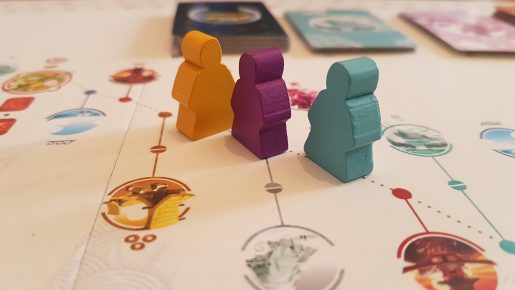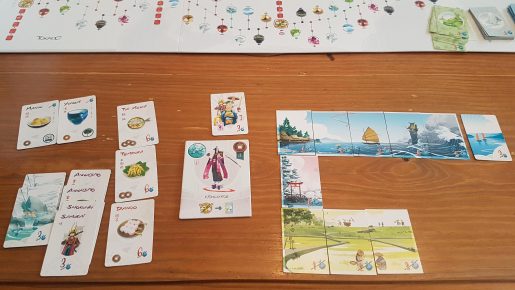Tokaido is a Japanese theme point to point movement board game journey, from Funforge, released originally back in 2012. Released right at the end of last year was the 5th anniversary edition, which this review focuses on, not to be confused with the collector’s edition. Designed by Antoine Bauza, Tokaido sees 2 – 5 players take around 30 – 45 minutes to travel from Kyoto to Tokyo, and become zen along the way. However, is this a journey you’ll want to join in on? Let’s find out!
At the start of the game each player is going to get two traveller tiles to choose from, each with their own unique player power. These range from getting a free meal at inns to stealing from local shops, all are benefits and will tweak the rules of the game for that player. Based on the chosen traveller players will also start with different amounts of coins, used for a variety of things throughout the journey.
The game of Tokaido revolves around the mechanics of it’s the turn of whomever is at the back, similar to golf. So, on a turn if you are at the back you may move forward, never backwards, as far as you want along the path up to and including entering the next inn. If after you have moved, and activated a space, you are still at furthest from the next inn you get to go again. Two players cannot land on the same space, though some locations do allow for multiple spaces to be available, in a 4 – 5 player game.
Along the journey the spaces will fall into the category of 9 simple actions. Visiting a local shop will see the player drawing three souvenir cards and purchase any they can afford to collects sets. These sets grant victory points determined on the number of unique types in the set, with unique types including: small objects, clothing, art and food. Next up is to take a relaxing bath in the hot springs, with or without monkeys; something that directly awards victory points.
Players are also able to encounter locals, drawing the top most encounter card and gaining the benefit: these range from getting a free souvenir from the shop deck to getting the next stage of a panorama for free. There are three panorama sets to collect, of three different sizes: 3, 4 and 5 cards. Panorama points add up, as you claim each piece of a set the point return increases, so continually visiting one type allows you to increasingly gain more points until the set is complete.
Another location that players can visit along their route are temples. Going to a temple allows the player to donate coins in exchange for victory points. Coins can run out though. On top of getting lucky with an encounter a player may choose to visit farms along the route to gain coins. Last but not least are the inns. Whenever the first person arrives at an inn they draw a number of the food cards from the deck (equal to the player count plus one): they are then able to choose and pay for one items of food. All food offers 6 victory points, yet they come with differing costs. To make choice more important players can only ever have one of each type of food. Therefore, being last to arrive at the inn, whilst guaranteeing first movement in the next round, leaves you little options and could mean they won’t be able to afford or buy what’s leftover.
Once everyone has arrived at an inn, and sorted out their food, it is on with the next leg of the journey towards the next inn. While some of the special powers trigger during along the route some trigger each time an inn is reached, so just pay attention to when yours activates. When arriving at the final inn it is time to score up, after some end game bonus tiles and additional points are earnt by whom has donated the most at temples, with the winner the player with the most points.
There are a range of bonus cards on offer, some earnt during the game and others awarded at the end. Be the first to finish one of the three panoramas and you’ll also gain a bonus card, worth 3 points. For the 5-part panorama and additional 3 points isn’t much compared to the 15 already earnt. Conversely, being first to finish the 3-part panorama increases its point return from 6 to 9, a 50% increase. Bonus points are also awarded at the end of the game to whomever has paid the most for the food they have eaten, whomever has encounter the most locals, brought the most from the stores and visited the most hot springs.
From the box art to the game board itself and even the player traveller tiles, the minimalist artwork is phenomenal. This sets the game apart from many, making it instantly eye-catching. This design isn’t just great visually, it also makes the board both extremely clean and, more importantly, clear. The spaces along the route are not hard to see from any angle and the symbols used match the cards they correspond to. As a bonus to this simplified visual structure, Tokaido truly is a treat for the eyes and conveys they Japanese and tranquillity theming well.
The path to victory initially looks an obvious one, stop at as many places along the way. This way you’ll encounter more, do more but you’ll also eat later at the inns. This might see you eating more expensive foods, something both positive and negative, or it might leave you unable to eat. On top of this someone else might jump ahead and claim a space you want, and with them not moving until they are at the back there is no way you can get to it. Timing when to jump ahead and when to block a space all build the experience; one that drives player choice as an integral part of the game.
Thematically a lot of Tokaido makes sense; you would have to stop at many points along the journey between Kyoto and Tokyo for example. Alas, as with many board games there is a large disconnect when it comes to what exactly the points are. Victory points are just magical numbers players get for doing things. Get past this and Tokaido is a pleasure to play. There is something extremely satisfying about moving along the route and chaining together a couple of movements when behind and seemingly getting to do a load of things. Striving to stop at key locations along the route will drive players to jump ahead and the thoughts of if it’s the right move will live on even after the game is finished. To me this shows a game and the choices it offers are meaningful when you’re still determining if the right decision was made hours later. For this reason and the stunning aesthetics, the game has earned its zen space on my shelf!
[Editor’s Note: Tokaido 5th Anniversary Edition was provided to us by Asmodee UK for review purposes. The game is currently available on 365 Games for £28.99. It is also available from local UK board game stores, find your local store here]

